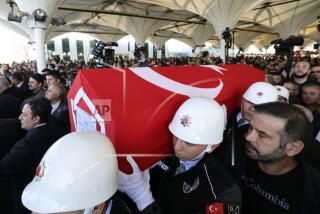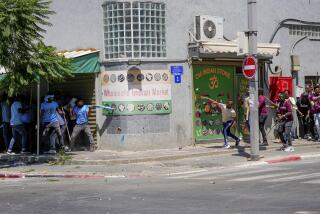Protests in Turkey Leave 3 Kurds Dead
- Share via
ANKARA, Turkey — Thousands of police and demonstrators clashed for a third day Thursday in the worst street violence to hit the country’s restive Kurdish region in more than a decade.
At least three demonstrators have been killed and more than 200 people injured in protests that erupted Tuesday in the city of Diyarbakir during funeral ceremonies for Kurdish rebels killed by the Turkish army over the weekend in nearby Mus province. The men were among 14 members of the outlawed separatist Kurdistan Workers Party, or PKK, who died in the fighting.
Fresh clashes broke out Thursday in Diyarbakir when tens of thousands of people gathered outside a mosque to bury two young men and an 8-year-old boy killed during Wednesday’s protests. Kurdish officials, including Diyarbakir Mayor Osman Baydemir, said two of the victims were shot by police.
Witnesses said teenagers hurled rocks Thursday at a police station and officers fought back with tear gas and nightsticks. Several demonstrators, including a 7-year-old boy, were wounded by bullets, which witnesses say were fired by police.
“The gunfire was coming from the police station,” said local journalist Ahmet Sumbul, who covered the demonstration.
The young boy was reported to be in critical condition. Authorities declined to comment on how he was injured.
The protests spread to the nearby city of Batman, where about 5,000 demonstrators chanting pro-PKK slogans threw firebombs at businesses and smashed the windows of banks and government offices.
“The situation is going from bad to worse -- a fire is enveloping the region,” Arif Aslan, the managing editor of the local daily newspaper, Batman Cagdas, said in a telephone interview.
Opposition leaders blamed the government for failing to take effective action to curb the unrest. “The sad reality is that they simply are sitting and watching events unfold from Ankara,” charged lawmaker Ali Topuz of the pro-secular Republican People’s Party, the main opposition group.
Government officials told Turkish newspapers Thursday that police had been ordered not to fire on demonstrators and to intervene only when necessary. The call for restraint is in line with the government’s efforts to join the European Union. The 25-member EU has long cited Turkey’s poor human rights record as one of the main reasons for thus far rebuffing its bid for membership.
A series of reforms adopted by Prime Minister Recep Tayyip Erdogan’s government, including easing bans on the Kurdish language, persuaded the EU to open membership talks with Turkey in October.
Kurdish leaders charge, however, that many of the reforms have been made only on paper. “The government does not have a Kurdish policy,” Sezgin Tanrikulu, chairman of the Diyarbakir Bar Assn., said by telephone.
Violence has been steadily escalating in the region since June 2004, when the PKK ended a unilateral truce it had declared after the capture of its leader, Abdullah Ocalan, in February 1999. Ocalan, convicted of treason, is currently the sole inmate of an island prison off the coast of Istanbul, where he is serving a life sentence. The PKK, which is on the State Department’s list of terrorist groups, said it was taking up arms again because of what it termed the government’s refusal to broker a lasting peace.
The rebels launched their armed fight -- initially for independence and later for autonomy -- in 1984. More than 30,000 people died and at least 1.5 million Kurds were displaced in the army’s scorched earth campaign against the PKK. An estimated 14 million Kurds live in Turkey.
Concern grew Thursday that the violence could spiral as the Interior Ministry launched an investigation of Diyarbakir Mayor Baydemir for expressing sympathy for the slain rebels.
A greater worry among Kurdish leaders is that Turkey’s hawkish generals, whose powers are being gradually trimmed in keeping with EU demands, will exploit the incidents to reassert their influence. “It clearly serves their agenda,” Tanrikulu said.
More to Read
Sign up for Essential California
The most important California stories and recommendations in your inbox every morning.
You may occasionally receive promotional content from the Los Angeles Times.









